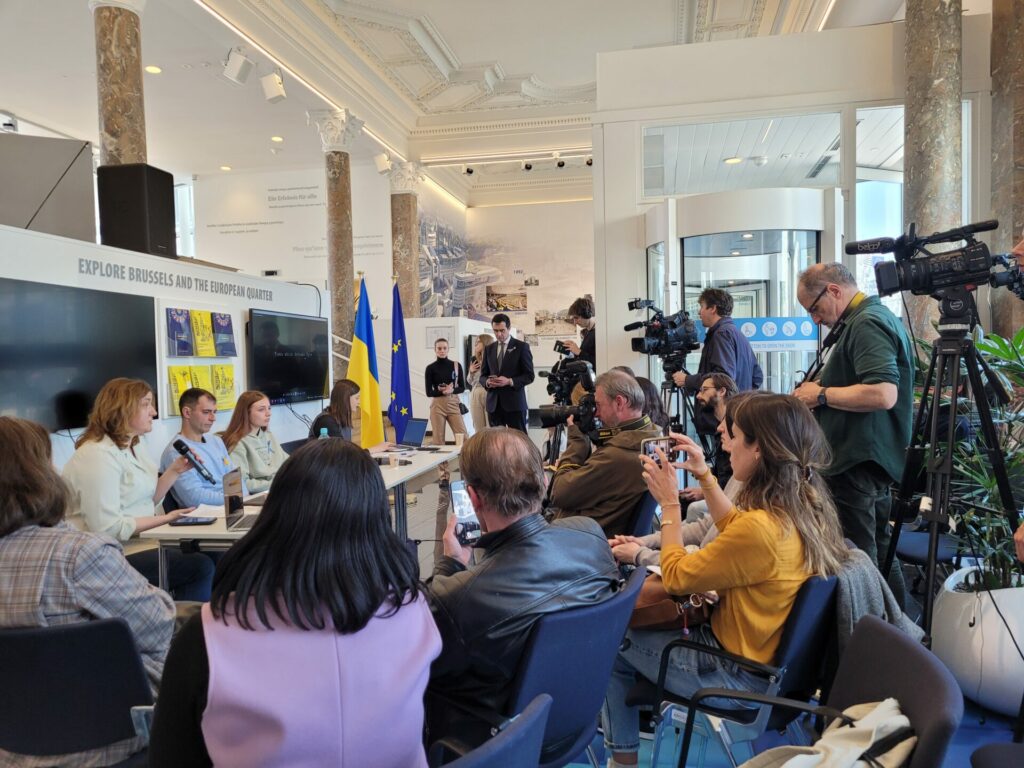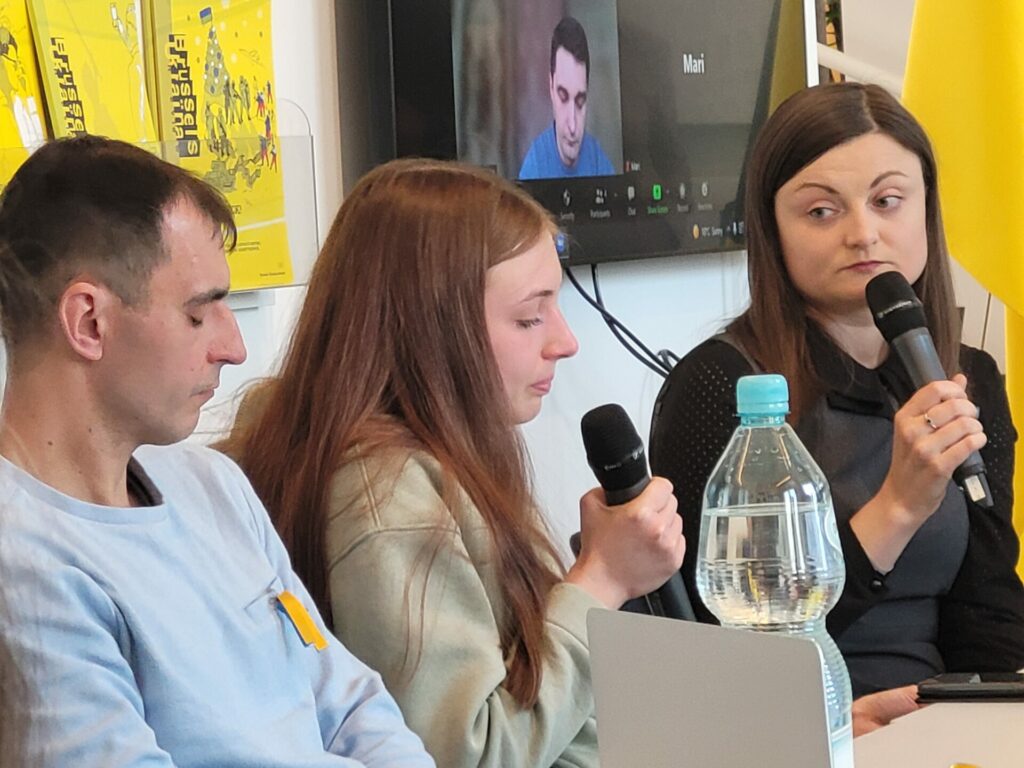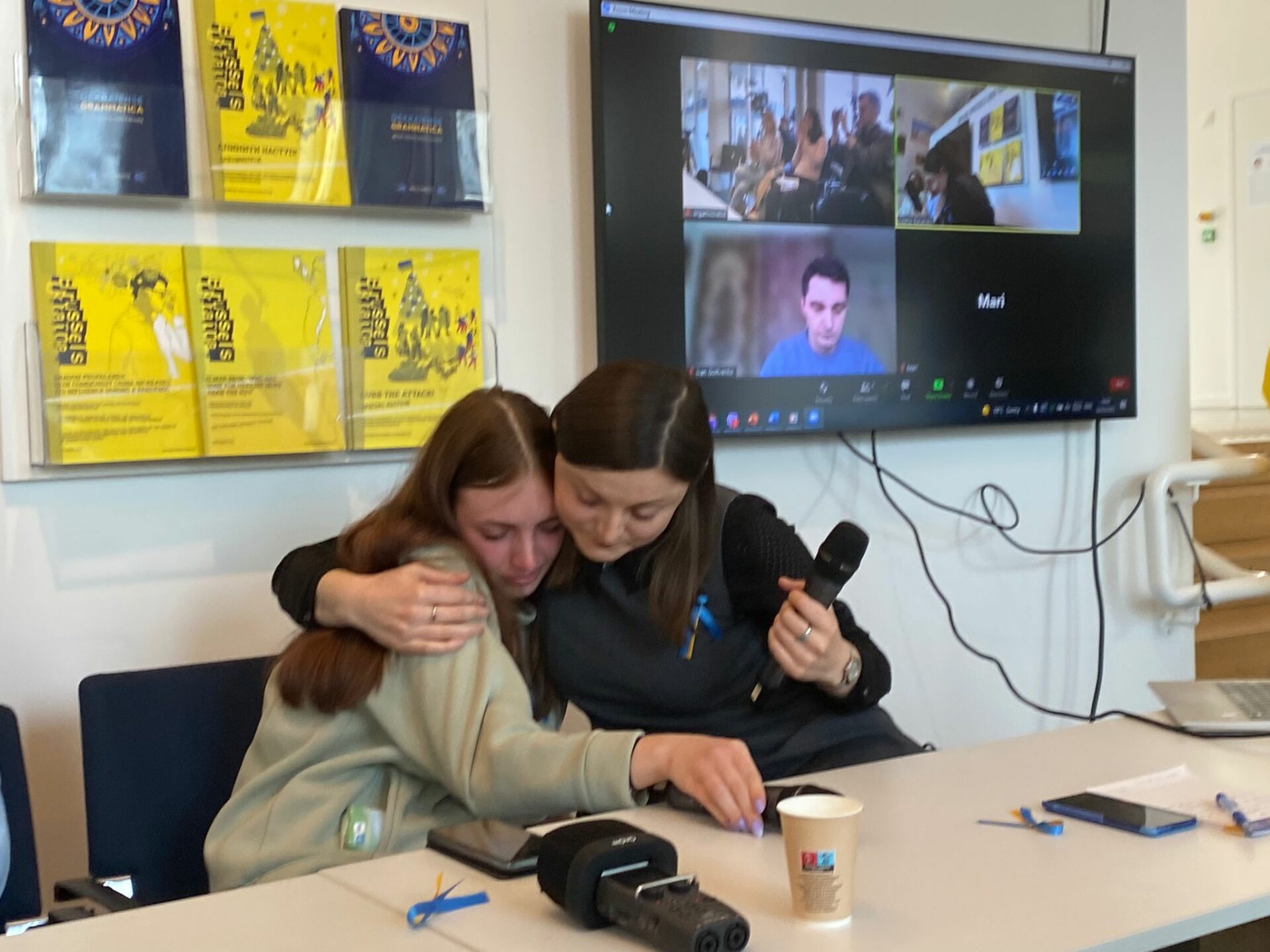At a press event held at the newly inaugurated Ukrainian Civil Society Hub in the European Parliament, donated by the European Parliament to Ukrainian advocacy group Promote Ukraine, Ukrainian refugees recounted their emotional escapes from Russia’s invasion, the destruction of their homes by Russian forces, and even the loss of loved ones and friends.
On the eve of Joe Biden’s visit to Ukraine, residents of the besieged towns and cities of Irpin, Bucha, Kharkiv, and Mariupol sat before the press to tell their stories to the world, calling for NATO to “close the skies over Ukraine” to prevent further destruction of their country and compatriots.

Credit: Dylan Carter
"Something no child should have to see"
Oleksandr, a father from the town of Bucha, sat in front of the press as his children looked on from the sidelines. His family had made a desperate escape from the city after heavy Russian bombardments.
“We woke up very early in the morning from a powerful explosion... A few hours later, we woke up and saw on TV that Russia had attacked, because we have ‘fascists and nationalists’ on our territory.”
Russian propaganda has repeatedly attempted to justify its invasion by portraying Ukraine, a nation run by a Jewish leader, as a state infiltrated by so-called "Nazis."
“When I heard this, I thought, ‘which fascists?’... but after having lived through the attacks on Bucha, I can assure you that the fascists are actually the Russian soldiers,” Oleksandr stated.
Oleksandr's small commuter town on the outskirts of Kyiv quickly became a focal point of fighting against Russian forces. "I went onto the street and saw a missile… I can’t explain with words the terrible noise that the missile makes and it haunts me still today," he said.
Leaving the town was all-but impossible as the roads were blocked with fleeing vehicles. But by March, with no power or water, it was no longer safe to stay.
“They destroyed everything…every building was damaged, there were fires…I was scared that we would be killed trying to leave the city, we saw a car with two dead civilians,” the Ukrainian refugee said.
“I wished that it was a nightmare”
Olga, a resident of Irpin, just 44 km from Kyiv, fled with her family to their country home on the outskirts of the city. Soon, she found herself sleeping in the cold with her children.
“Every single night we heard explosions, we heard the war, lots of aircraft flying over our heads,” Olga said. Her village was left without electricity, water, or mobile connection, and the village stores ran out of food.
Eventually fleeing their home, her family crossed the only remaining bridge across the Irpin river, as all others had been destroyed. Less fortunate people were forced to flee through swamps and fields, with the help of the Ukrainian army.
“The Russians killed my colleague in Irpin. They killed her because she was driving and delivering food for children,” Olga said, fighting back tears.
"Shot and killed in front of his mother"
Before the war, Diana was a university honours student in Kharkiv, Ukraine’s second-largest city in the east of Ukraine. She had looked forward to a bright future. Now, she is a refugee in Belgium.
“We felt our skin shaking from the shelling and the bombs. The first night in the bomb shelter was the coldest one in my life. I couldn’t sleep, I couldn’t close my eyes…the bombs just continued dropping."
Related News
- 'It was mayhem': A Belgian’s escape from Ukraine
- Thousands of Ukrainians reach Belgium, reception centres overwhelmed
Diana feared for her escape. Just a few days prior to her departure, she read in the local press that a bus carrying university students had been fired upon and destroyed by Russian forces not far from where she was sheltering. Anyone on that bus, she said, could have been one of her classmates.
For Diana, the war hit close to home. She learned that her classmate had been murdered, shot dead by Russian troops in front of his own mother. “When you lose someone close… after a while your body just goes numb and your tears disappear,” the student said, with tears rolling down her face.
Just a year before, the mother of the killed student had lost her husband. “I honestly don’t know how someone survives something like this,” Diana lamented. The young student would eventually escape Kharkiv. She had always dreamed of coming to Europe to study, but not as a refugee.

Credit: Dylan Carter
“What happened to Mariupol can happen in your town”
Ivan and Maria once lived in Mariupol, a city on the frontline now witnessing one of the worst humanitarian crises in Europe. Joining the event by live video feed, they spoke fondly of their home, which is now nearly 90% damaged or destroyed, according to the Ukrainian government.
Ivan showed before and after photos of some of the city’s apartment buildings and iconic landmarks. Most have been completely flattened by Russian bombing.
A particularly harrowing account concerned a theatre sheltering children. It had been clearly labelled to deter Russian bombing but was nevertheless bombed by aircraft, trapping thousands under rubble.
“My colleague was inside the building. He told me of the screams of the children that were buried under the rubble. Emergency services could not get to them because the bombing didn’t stop."
Maria came to visit her parents in Mariupol just one day before the war only to get caught up in a truly hellish situation. To escape, she had to bribe Russian soldiers with vodka and cigarettes, pleading with them not to shoot at their car. In total, she had to pass through three Russian blockades, bribing and begging her way out of the city.
Maria escaped but without her parents, who were trapped in the city for another two weeks. During this time, she heard nothing from them, and feared them dead. Fortunately, at the end of the two weeks, she received a phone call to say that her parents had escaped.
While Maria and her family had escaped with their lives, everything that they owned has been destroyed. “We don’t have a home anymore, it’s all burned down.”
A protest is currently taking place in front of the NATO summit calling for a no-fly zone to be imposed on Russia.

